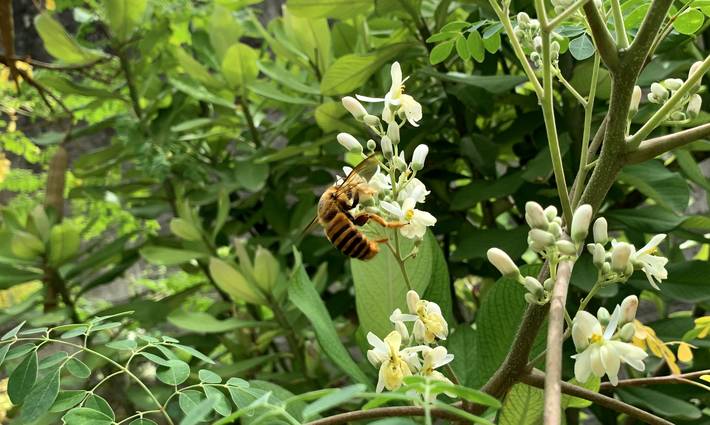2022 CALL FOR PROPOSAL CONCEPTS
JRS invites the submission of concept notes for project funding from sub-Saharan Africa to enhance capacity for mobilization, use and dissemination of biodiversity data in support of policymaking for sustainable development.
This RFP offers support for four grant types in 2022:
- Grants that establish or strengthen Freshwater biodiversity collaborations to increase research and data addressing local, national or regional freshwater development policy;
- Grants that further Pollinator biodiversity research, data use and collaborations to demonstrate the critical importance of pollinators to African economies and ecosystems;
- Grants that support African 30-by-30 goals for conservation (an aspirational CBD goal), using best science and data for decision-making;
- Grants that aim to enhance African representation in the post-2020 Global Biodiversity Framework process especially through building capacity in generating, analyzing, communicating and sharing African biodiversity information.
In addition, proposals should contain common elements regardless of thematic focus:
- All proposals must demonstrate elements of capacity-building for African stakeholders and institutions in bioinformatics, biodiversity science and applied data use for key African stakeholders and institutions
- All proposals must demonstrate an intent and modality to communicate project results to key audiences and decision-makers
- All proposals should articulate ways in which scientific and biodiversity data can clearly respond to a specific policy need for African institutions and society
JRS grants are open to institutions based in sub-Saharan Africa. Concept notes must be submitted by 31 July 2022 through the JRS website. Following review of the concept notes, JRS will invite applicants successful in this round to submit a full proposal.
Following final review and selection, funded projects are expected to start in early 2023 with a project implementation period of between 12 and 36 months.
General recommendations for preparing concept notes
- Ensure that your project is clearly within the RFP focus areas and aligns with JRS’ strategic objectives and values.
- Funding levels: most projects are funded by JRS fall within the $50,000 and $250,000 range. Amounts outside this range will need clear justifications.
- Be brief. Summarize activities and impact proposed, with minimal background information, using links to external references rather than long explanations.
- Key Factors. Compelling projects will demonstrate innovation, partnerships, regional linkages and clearly aim to impact policy through data use and sharing.
- Methodology. Where relevant, methodologies proposed should be well described i.e. sampling design, replication, analytical approaches
- Data Sharing. Data sharing modalities must be well described and preferably make use of established technologies and tools unless the project aims specifically to improve same.
General eligibility requirements
-
- Concept notes and full proposals must be submitted in English through the JRS Portal by the respective deadlines.
- Applicant project sites must be located in the sub-Saharan Africa geographic region. Eligible entities may include government agencies, conservation institutions, natural history museums, universities, research institutes, civil society networks and NGOs.
- All JRS-funded activities must be not-for-profit. JRS funds may be used to support staff, travel, costs associated with the organization of meetings, workshops, and IT services and equipment.
- If invited to submit a full proposal, applicants must provide plans to ensure sustainability of activities after project support from JRS concludes.
- If invited to submit a full project proposal, written confirmation from all project partners confirming their involvement in the project, must be provided with the submission.
- All proposed project activities must fall within the stated implementation periods for each grant type.
- If invited to submit a full proposal, applicants must prepare a detailed budget. Overhead costs are limited depending on grantee category.
- Applicants are encouraged to explore co-funding (in kind or cash) to their projects. Co-funding refers to real costs that are incurred by the applicants while executing the funded project’s activities. These include in-kind contributions that directly contribute to the project activities (i.e., staff salaries, travel costs etc.) or any in-cash contributions to grant activities from other funding sources.
- Letters of support from confirmed project partners should be submitted through the JRS grants portal.
- Applicants must affirm that all data mobilized through JRS grants be made openly accessible and shared on a non-proprietary data platform.
Questions? contact us at JRSRFP@jrsbiodiversity.org
Application process
The project lead submits a concept note through the JRS grants portal, which will be screened to ensure that it meets eligibility criteria and falls within the scope of the JRS priorities. After this, the concept note will be reviewed independently by assessors and scored against the following selection criteria:
- Relevance of the proposal to the objectives and recommended activities of the JRS priority area
- Expected value of the project’s deliverables to both the national and regional context and the broader community of biodiversity information holders and users
- Likelihood of the project achieving sustainable program results
- Likelihood of the project providing examples of best practices in bridging biodiversity information to decision-making
- Project cost-effectiveness, including factors such as the number of partners benefiting from the project, matching funds leveraged, etc.
- Choice and diversity of project allies, participants and partners
The JRS will invite applicants for selected concept notes to submit a full proposal separately. The invitation may be accompanied by recommendations for further consideration in the full proposal and may include comments regarding the budget or suggestions relating to possible pairing of the project with another submitted concept note. Full proposals will be submitted to the same process as the concept note, with independent review and scoring by assessors, and prioritization by the selection panel. Final recommendations for funding may seek geographic and thematic balance, representative grant types, as well as a balance between experienced and new project teams, to ensure the best overall impact of JRS funding awards.
Source: JRS Biodiversity Foundation





